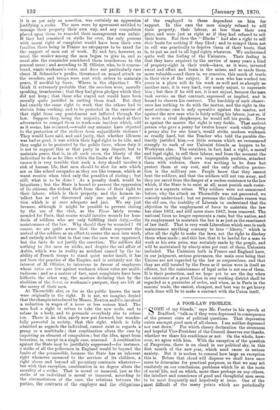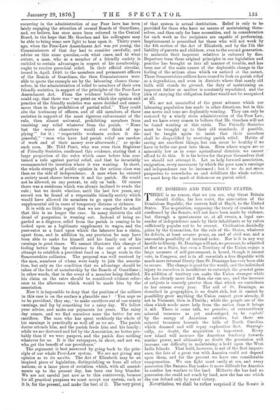A POOR-LAW PROBLEM.
" Q OME of my friends," says Mr. Forster in his speech at kJ Bradford, "talk as if they were depressed in consequence of the present state of political questions. That depression exists amongst good men of all classes. I am neither depressed nor cast down." For which cheery declaration the strenuous and hopeful Vice-President of the Council deserves our thanks, whether we share his confidence or not. On the whole, how- ever, we agree with him. With the exception of the question of Pauperism, there is no cloud in our political sky, in this first month of the new year, which need cause us serious anxiety. But it is useless to conceal how large an exception this is. Before that cloud will disperse we shall have once more to determine for practical purposes, so that we may act resolutely on our conclusions, problems which lie at the roots of social life, and on which, more than perhaps on any others, the intellect and conscience of good and thoughtful men seem to be most frequently and hopelessly at issue. One of the most difficult of the many points which are periodically recurring in the administration of our Poor laws has been lately engaging the attention of several Boards of Guardians, and, we believe, has once more been referred to the Central Board, in the hope that Mr. Goschen and his colleagues may be able to bring some new light to bear upon it. Thirty years ago, when the Poor-Law Amendment Act was yet young, the Commissioners of that day had to consider carefully, and advise on this same question,—in what cases, and to what extent, a man, who as a member of a friendly society is entitled to certain advantages in respect of his membership, ought to receive parochial relief. In their official circular, issued in April, 1840, to the members and permanent officers of the Boards of Guardians, the then Commissioners were able to quote the example set by the labouring classes them- selves, in the administration of relief to members of their own friendly societies, in support of the principles of the Poor-Law Amendment Act. From the evidence before them they could say, that there was "no point on which the opinion and practice of the friendly societies was more decided and unani- mous than in the prohibition of partial relief." They could cite the testimony of officers, and of old members, of these societies in support of the most rigorous enforcement of the rule, then almost universal, prohibiting members from receiving any relief whatever from the parish. "None but the worst characters would ever think of ap- plying" for it ; "respectable workmen reckon it dis- graceful," "men who have had parish relief are careless of work and of their money ever afterwards ;" so spoke such men. Mr. Tidd Pratt, who was even then Registrar of Friendly Societies, confirmed this evidence, stating that a large proportion of the rules which came before him con- tained a rule against partial relief, and that he invariably recommended its insertion where it was wanting. In short, the whole strength of public opinion in the artisan class was then on the side of independence. A man when he entered a society must choose between it and the parish. He would not be allowed, on any pretext, to rely on both. Of course there was a residuum which was always inclined to evade the rule' but we doubt whether, until the last few years, any record can be found of a respectable friendly society which would have allowed its members to go upon the rates for supplemental aid in cases of temporary distress or sickness.
It is with no little regret that we are compelled to admit that this is no longer the case. In many districts the old dread of pauperism is wearing out. Instead of being re- garded as a disgrace, relief from the parish is coming to be looked upon as a legitimate supplement to wages, and the poor-rates as a fund upon which the labourer has a claim, apart from, and in addition to, any provision he may have been able to make for himself and his family out of his earnings in good times. We cannot illustrate this change of feeling better than by reference to the case of a recent attempt to establish a provident fund on a large scale in the Somersetshire collieries. The proposal was well received by the men, numbers of whom were ready to join the associa- tion, but only on the condition that no advantage should be taken of the fact of membership by the Boards of Guardians ; in other words, that in the event of a member being disabled, his claim on the rates should be considered without refer- ence to the allowance which would be made him by the association.
Now it is impossible to deny that the position of the colliers in this case is on the surface a plausible one ? 'You urge us to be provident,' they say, to make sacrifices out of our scanty earnings, and lay by something for a rainy day. We follow your advice, and make our payments for years. The rainy day comes, and we find ourselves none the better for our sacrifices. The man who has spent recklessly the whole of his earnings is practically as well off as we are. The parish doctor attends him, and the parish feeds him and his family; while we are doctored and fed by the Association, no better pro- bably than if we were paupers, and the parish does nothing whatever for us. It is the ratepayers, in short, and not we, who get the benefit of our providence.'
The argument is best answered by going back to the prin- ciple of our whole Poor-Law system. We are not giving any opinion as to its merits. The Act of Elizabeth may be an inspired piece of legislation, distinguishing us from all other nations, or a lame piece of socialism which, with all amend- ments up to the present day, has been one long blunder. We are not careful just now as to this controversy, because for all practical purposes we must accept our system, such as it is, for the present, and make the best of it. The very pivot
of that system is actual destitution. Relief is only to be provided for those who have no means of maintaining them- selves, and then only for bare necessities, and in consideration for such work as the recipients are capable of performing. Imprisonment is prescribed for those who will not work by the 4th section of the Act of Elizabeth, and by the 7th the liability of parents and children, even to the second generation, to maintain their impotent relatives is enforced by fine. Departure from these original principles in our legislation and practice has brought us into all manner of trouble, and has been one of the main causes of the deplorable change in the feeling of the artizan class which we noticed at the outset. These Somersetshire colliers have ceased to look on parish relief as a degradation, and even in districts where that manly old faith still stands its ground, the duty of maintaining an impotent father or mother is constantly repudiated, and the idea of carrying the obligation further would not be recognized at all.
We are not unmindful of the great advance which our labouring population has made in other directions, but in this one nerve and tone are deplorably wanting. They can only be restored by a wisely stern administration of the Poor Law, and we have every reason to believe that Mr. Goschen will not be found wanting at this crisis. The Friendly Societies must be brought up to their old standards, if possible, and be taught again to insist that their members shall be disqualified by receiving parish relief. Habits of saving are excellent things, but can never be healthy if we have to bribe our poor into them. Even where wages are so miserably low as in some agricultural districts, we cannot afford to do this. It is far better for the poor themselves that we should not attempt it. Let us help forward association, emigration, every movement by which the poor man's earnings and independence can be increased ; but if we do not mean pauperism to overwhelm us and debilitate the whole nation, we must keep the mark of dishonour on parish relief.



































 Previous page
Previous page